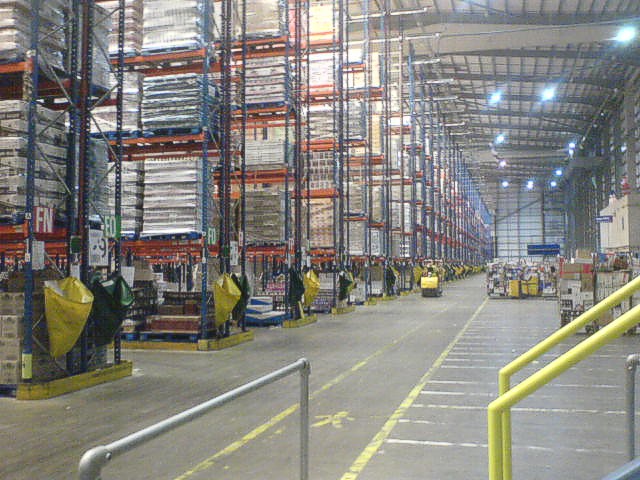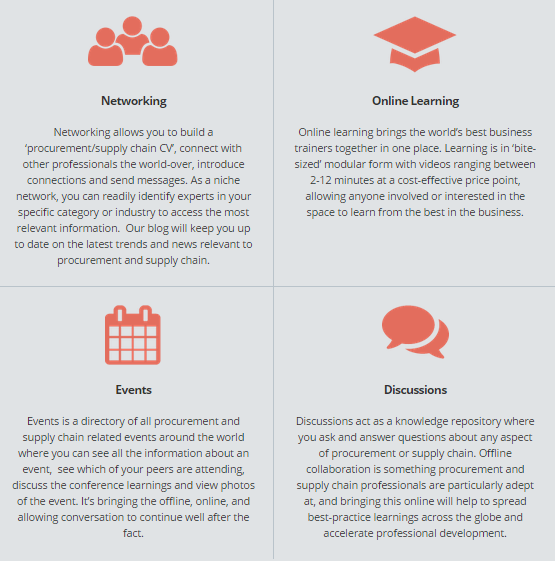
by Fronetics | Nov 25, 2014 | Blog, Internet of Things, Marketing, Social Media, Strategy, Supply Chain

The 2014 UPS B2B Buyers Insight Study found that companies need to have a strong online presence to grow their business.
Buyers are looking for information online
Buyers are conducting research on industrial suppliers online. Sixty-eight percent of buyers research supply purchases via supplier website, and 52 percent use search engines.
In their report, UPS and TNS discuss the importance of a strong online presence:
“Given buyers’ high satisfaction levels with supplier performance on key selection criteria, and considering that web-based research is most preferred, it’s reasonable to infer that many buyers consider online research essential to their supplier selection process. The use of search engines means that suppliers may be at greater risk of losing share to companies whose products are perhaps easier to find, in stock or competitively priced. On the other hand, suppliers whose products are easy to find online and meet buyers’ criteria may also stand to gain customers.”
Being able to buy online is more important to buyers than a sales rep
Being able to access information about products online and being able to make purchases online is more important to buyers than sales representatives and printed catalogs.
Respondents were asked to rate attributes with respect to deciding from which industrial supplies vendor to purchase. Seventy-eight percent of respondents rated product information on the supplier website as “extremely important” or “very important.” Seventy-four percent of respondents rated the ability to make purchases on the supplier’s website as “extremely important” or “very important.” In contrast, fifty-eight percent of respondents rated having a sales representative as “extremely important” or “very important.” Fifty-four percent of respondents rated having a hardcopy product catalog as “extremely important” or “very important.”
Buyers like to purchase through websites
Sixty-three percent of industrial supplies buyers reported that they purchase through websites (directly from suppliers or via a third-party provider).
Sixty-seven percent of buyers responded that the ability to order through a supplier’s website is considered “extremely important” or “very important”
If you think your current customers don’t care if you don’t offer the ability to purchase products online – think again. The survey found that 34 percent of buyers say that they have gone outside of their existing supply base to make an online purchase.
Meet your customers online
Having a strong online presence is an essential component to your business strategy. If you want to grow your business you need to be online. UPS and TNS sum this up nicely:
“Be in the right place when buyers are looking: Having a superior supplier website with stellar functionality means little if buyers can’t find the site or don’t know it’s available. Making sure products and supplier information can be found easily by search engines (SEO), and being visible when buyers search for products (SEM), are essential strategies for retaining and increasing customer base.”

by Fronetics | Nov 25, 2014 | Blog, Internet of Things, Marketing, Social Media, Strategy, Supply Chain

The 2014 UPS B2B Buyers Insight Study found that companies need to have a strong online presence to grow their business.
Buyers are looking for information online
Buyers are conducting research on industrial suppliers online. Sixty-eight percent of buyers research supply purchases via supplier website, and 52 percent use search engines.
In their report, UPS and TNS discuss the importance of a strong online presence:
“Given buyers’ high satisfaction levels with supplier performance on key selection criteria, and considering that web-based research is most preferred, it’s reasonable to infer that many buyers consider online research essential to their supplier selection process. The use of search engines means that suppliers may be at greater risk of losing share to companies whose products are perhaps easier to find, in stock or competitively priced. On the other hand, suppliers whose products are easy to find online and meet buyers’ criteria may also stand to gain customers.”
Being able to buy online is more important to buyers than a sales rep
Being able to access information about products online and being able to make purchases online is more important to buyers than sales representatives and printed catalogs.
Respondents were asked to rate attributes with respect to deciding from which industrial supplies vendor to purchase. Seventy-eight percent of respondents rated product information on the supplier website as “extremely important” or “very important.” Seventy-four percent of respondents rated the ability to make purchases on the supplier’s website as “extremely important” or “very important.” In contrast, fifty-eight percent of respondents rated having a sales representative as “extremely important” or “very important.” Fifty-four percent of respondents rated having a hardcopy product catalog as “extremely important” or “very important.”
Buyers like to purchase through websites
Sixty-three percent of industrial supplies buyers reported that they purchase through websites (directly from suppliers or via a third-party provider).
Sixty-seven percent of buyers responded that the ability to order through a supplier’s website is considered “extremely important” or “very important”
If you think your current customers don’t care if you don’t offer the ability to purchase products online – think again. The survey found that 34 percent of buyers say that they have gone outside of their existing supply base to make an online purchase.
Meet your customers online
Having a strong online presence is an essential component to your business strategy. If you want to grow your business you need to be online. UPS and TNS sum this up nicely:
“Be in the right place when buyers are looking: Having a superior supplier website with stellar functionality means little if buyers can’t find the site or don’t know it’s available. Making sure products and supplier information can be found easily by search engines (SEO), and being visible when buyers search for products (SEM), are essential strategies for retaining and increasing customer base.”

by Fronetics | Nov 13, 2014 | Blog, Marketing, Social Media, Strategy, Supply Chain

Founded in 1997, Cerasis is a top North American third party logistics company offering logistics solutions with a strong focus on LTL freight management. For 15 years the company utilized traditional marketing strategies – placing ads in glossy industry publications (print) and relying heavily on referrals. This strategy was effective. The company acquired new customers, retained current customer, and realized positive growth. However, Cerasis was not attracting larger and more sophisticated shippers, and brand awareness was low. Moreover, Cerasis was not perceived as a leader within the industry. The company recognized that in order to catch the attention of their preferred customers, increase brand awareness, and be perceived as a leader within the industry they needed to make substantial changes to their marketing strategy. To overcome these challenges Cerasis decided to shift from their traditional approach to an inbound marketing strategy.
Strategy matters
Understanding that strategy is critical to success, Cerasis took the time to put a strategy in place. Taking a research-based approach to strategy development, Cerasis studied internal company data, trends, and metrics and conducted market research. Using this information Cerasis determined the type of messaging it wanted to share, identified their target audience (buyer persona), and identified the platforms it felt would be the most effective.
Adam Robinson, Director of Marketing at Cerasis, notes that the company took a measured approach:
“Once we had a strategy in place we needed to execute it. We started simply – we posted one piece of content each day.”
Revenue matters
Cerasis’ strategy paid off. Within 25 months Cerasis realized a 14% increase in revenue. This increase was directly attributable to inbound marketing. In addition this stream of revenue, the company’s sales team was able to generate revenue totaling $20 million during this period – more than double the previous two years combined. This can also be linked to the company’s inbound marketing efforts as they increased the company’s brand awareness and positioned Cerasis as a leader within the industry.
To learn more about Cerasis’s approach to inbound marketing and the results realized, download the case study: 3PL Cerasis acquires 98 new customers through inbound marketing.

by Fronetics | Nov 13, 2014 | Blog, Marketing, Social Media, Strategy, Supply Chain

Founded in 1997, Cerasis is a top North American third party logistics company offering logistics solutions with a strong focus on LTL freight management. For 15 years the company utilized traditional marketing strategies – placing ads in glossy industry publications (print) and relying heavily on referrals. This strategy was effective. The company acquired new customers, retained current customer, and realized positive growth. However, Cerasis was not attracting larger and more sophisticated shippers, and brand awareness was low. Moreover, Cerasis was not perceived as a leader within the industry. The company recognized that in order to catch the attention of their preferred customers, increase brand awareness, and be perceived as a leader within the industry they needed to make substantial changes to their marketing strategy. To overcome these challenges Cerasis decided to shift from their traditional approach to an inbound marketing strategy.
Strategy matters
Understanding that strategy is critical to success, Cerasis took the time to put a strategy in place. Taking a research-based approach to strategy development, Cerasis studied internal company data, trends, and metrics and conducted market research. Using this information Cerasis determined the type of messaging it wanted to share, identified their target audience (buyer persona), and identified the platforms it felt would be the most effective.
Adam Robinson, Director of Marketing at Cerasis, notes that the company took a measured approach:
“Once we had a strategy in place we needed to execute it. We started simply – we posted one piece of content each day.”
Revenue matters
Cerasis’ strategy paid off. Within 25 months Cerasis realized a 14% increase in revenue. This increase was directly attributable to inbound marketing. In addition this stream of revenue, the company’s sales team was able to generate revenue totaling $20 million during this period – more than double the previous two years combined. This can also be linked to the company’s inbound marketing efforts as they increased the company’s brand awareness and positioned Cerasis as a leader within the industry.
To learn more about Cerasis’s approach to inbound marketing and the results realized, download the case study: 3PL Cerasis acquires 98 new customers through inbound marketing.

by Fronetics | Nov 6, 2014 | Blog, Internet of Things, Marketing, Social Media, Supply Chain
I was recently introduced to a new social network: Procurious. Procurious is a niche social network and online community created for procurement and supply chain professionals. It is a wealth of information, resources, and opportunity.
Developed by procurement and supply chain professionals, Procurious offers a wealth of resources and opportunity for those within the industries. It not only includes a social networking platform which can be leveraged for networking, communication, and sharing of knowledge, it also provides a comprehensive listing of events happening throughout the globe, on-line learning, a blog, and a news feed. In short, it can be seen as a go-to resource for procurement and supply chain professionals.
Procurious is markedly global – Members come from 70+ countries. Given the global nature of the procurement and supply chain industries, the global nature of Procurious is inherently valuable. Moreover, as the supply chain industry faces a talent gap and suffers from misperceptions, Procurious puts a much needed “fresh face” on procurement.
“We know that the procurement and supply chain profession has struggled to overcome outdated stereotypes and it’s time we join forces to become more collectively valued. By empowering our future procurement and supply chain leaders, we aim to change the face of the profession from the inside out.”
Why join the network? Here are four reasons:

After a four month beta period, Procurious launched in early 2014. Since the launch, the network has realized positive growth:
- 2000+ members
- Members from 70+ Countries
- Members come from the private and public sector, including from some of the world’s largest businesses, such as: Apple, Telstra, Lloyd’s Banking Group, Alcoa, Rio Tinto, NHS, Schweppes and IBM
- 20+ online learning modules – all currently free to access
As I have discussed before, not only is it impossible for you and your business to be present on every social network, it is also not a good use of time and resources. Instead, you need to identify which social networks (or even which social network) is right for you and for business.
Procurious is worth checking out. It is free to join and, at this time, all online learning and resources are free. Register at www.procurious.com

by Fronetics | Nov 6, 2014 | Blog, Internet of Things, Marketing, Social Media, Supply Chain
I was recently introduced to a new social network: Procurious. Procurious is a niche social network and online community created for procurement and supply chain professionals. It is a wealth of information, resources, and opportunity.
Developed by procurement and supply chain professionals, Procurious offers a wealth of resources and opportunity for those within the industries. It not only includes a social networking platform which can be leveraged for networking, communication, and sharing of knowledge, it also provides a comprehensive listing of events happening throughout the globe, on-line learning, a blog, and a news feed. In short, it can be seen as a go-to resource for procurement and supply chain professionals.
Procurious is markedly global – Members come from 70+ countries. Given the global nature of the procurement and supply chain industries, the global nature of Procurious is inherently valuable. Moreover, as the supply chain industry faces a talent gap and suffers from misperceptions, Procurious puts a much needed “fresh face” on procurement.
“We know that the procurement and supply chain profession has struggled to overcome outdated stereotypes and it’s time we join forces to become more collectively valued. By empowering our future procurement and supply chain leaders, we aim to change the face of the profession from the inside out.”
Why join the network? Here are four reasons:

After a four month beta period, Procurious launched in early 2014. Since the launch, the network has realized positive growth:
- 2000+ members
- Members from 70+ Countries
- Members come from the private and public sector, including from some of the world’s largest businesses, such as: Apple, Telstra, Lloyd’s Banking Group, Alcoa, Rio Tinto, NHS, Schweppes and IBM
- 20+ online learning modules – all currently free to access
As I have discussed before, not only is it impossible for you and your business to be present on every social network, it is also not a good use of time and resources. Instead, you need to identify which social networks (or even which social network) is right for you and for business.
Procurious is worth checking out. It is free to join and, at this time, all online learning and resources are free. Register at www.procurious.com




